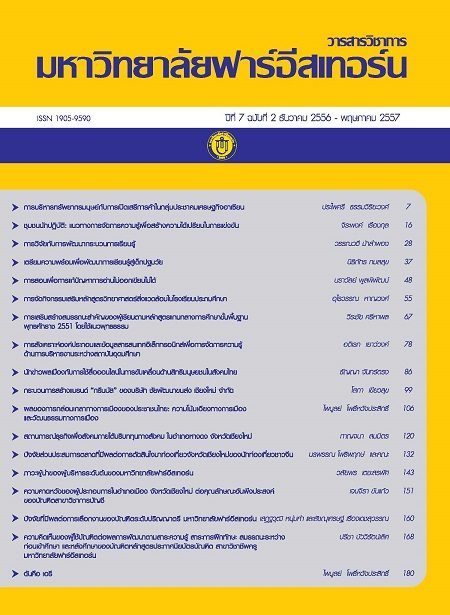การจัดกิจกรรมเสริมหลักสูตรวิทยาศาสตร์สิ่งแวดล้อมในโรงเรียนประถมศึกษา
Main Article Content
Abstract
การวิจัยครั้งนี้มีวัตถุประสงค์เพื่อ (1) สร้างกิจกรรมเสริมหลักสูตรวิทยาศาสตร์สิ่งแวดล้อมสำหรับนักเรียนประถมศึกษา และ (2) ศึกษาผลการจัดกิจกรรมเสริมหลักสูตรวิทยาศาสตร์สิ่งแวดล้อมสำหรับนักเรียนประถมศึกษา กลุ่มตัวอย่าง คือ นักเรียนชั้นประถมศึกษาปีที่ 4 ถึงชั้นประถมศึกษาปีที่ 6 ปีการศึกษา 2554 จำนวน 227 คน ประกอบด้วย (1) นักเรียนโรงเรียนชลประทานผาแตก จำนวน 107 คน (2) นักเรียนโรงเรียนวัดขะจาว จำนวน 80 คน และ (3) นักเรียนโรงเรียนวัดช่างเคี่ยน จำนวน 40 คน เครื่องมือที่ใช้ในการวิจัย มี 3 รายการ คือ (1) กิจกรรมเสริมหลักสูตรวิทยาศาสตร์สิ่งแวดล้อม (2) แบบวัดทักษะกระบวนการทางวิทยาศาสตร์ และ (3) แบบวัดเจตคติต่อสิ่งแวดล้อม ทำการวิเคราะห์ข้อมูลโดยการแจกแจงความถี่ อธิบายแนวโน้มเข้าสู่ส่วนกลางด้วยค่าเฉลี่ยเลขคณิต และการวิเคราะห์เนื้อหา ผลการวิจัยที่ได้คือ (1) ได้กิจกรรมเสริมหลักสูตรวิทยาศาสตร์สิ่งแวดล้อม 5 กิจกรรมหลัก รวม 14 กิจกรรมย่อย ในแต่ละกิจกรรมเสริมหลักสูตรวิทยาศาสตร์สิ่งแวดล้อมที่มีต่อนักเรียนพบว่า (2.1) นักเรียนมีร้อยละคะแนนเฉลี่ยของทักษะกระบวนการทางวิทยาศาสตร์ทุกทักษะสูงกว่าเกณฑ์การผ่าน (70%) ทักษะที่นักเรียนมีร้อยละคะแนนเฉลี่ยสูงสุดคือ ทักษะการวัด รองลงมา คือ ทักษะการสังเกต และ (2.2) นักเรียนมีเจตคติ ต่อสิ่งแวดล้อมอยู่ในระดสับการจัดระบบมากเป็นอันดับ 1 รองลงมาคือ ระดับการเห็นคุณค่า ระดับการตอบสนอง และระดับการรับรู้ ตามลำดับ
This research was to (1) construct the extra-curriculum to support environment-related science for elementary school students, and (2) study the results of organizing extra-curriculum to support the environment-related science for elementary school students. The samples included 227 Prathom Suksa 4-6 students enrolled in the 2011 academic year or classified basing on the school as (1) 107 students from Chonlaprathan Pha Taek School, (2) 80 students from Wat Khajaw School, and, (3) 40 students from Wat Chang Khian School. Three research instruments were used-(1) extra-curriculum activities on environment-related science in elementary school, (2) scientific skill assessing scale, and (3) attitude toward environment scale. The collected data were analyzed in terms of frequency, standard deviation, arithmetic mean, and content analysis. As a result of the research, (1) there were 5 main extra-curriculum activity plans composing of 14 sub-plans each of which was related to 4-8 science process skills. Regarding the effect of the extra-curriculum activities, (2) it was found that (2.1) the students had mean score in every skill of science process higher than the set criterion of 70% with the highest mean score on measuring skill followed by observational skill and (2.2) the students had the highest attitude towards environment at classification level, followed, in ranking order, by value recognition, response, and perception levels.
Article Details
1. Any views and comments in the FEU Academic Review Journal are the authors’ views. The editorial staff have not to agree with those views and it is not considered as the editorial’s responsibility.
2. The responsibility of content and draft check of each article belongs to each author. In case, there is any lawsuit about copyright infringement. It is considered as the authors’ sole responsibility.
3. The article copyright belonging to the authors and the Far Eastern University are copyrighted legally. Republication must be received direct permission from the authors and the Far Eastern University in written form.
